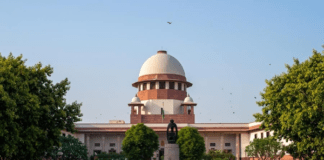Supreme Court holds that IBC moratorium doesn’t prevent a corporate debtor from voluntarily surrendering leased assets if CoC approves.
In a key ruling, the Supreme Court clarifies that the IBC moratorium does not prevent a corporate debtor from surrendering leased premises if approved by the CoC.
Supreme Court Clarifies Scope of IBC Moratorium
On August 5, 2025, the Supreme Court of India clarified the extent of protection available under the moratorium imposed by Section 14 of the Insolvency and Bankruptcy Code, 2016 (IBC). A Division Bench comprising Justices Sanjay Kumar and S.C. Sharma held that voluntary surrender of leased property by a corporate debtor is not barred by the moratorium, provided that the Committee of Creditors (CoC) supports the move in the interest of the ongoing insolvency process.
The judgment overturns a prior decision by the National Company Law Appellate Tribunal (NCLAT), which had restricted lessors from reclaiming possession of leased premises during the moratorium period, irrespective of whether the debtor was willing to surrender the asset.
Background of the Case
The case arose during the Corporate Insolvency Resolution Process (CIRP) of a company that was operating from a leased commercial property. Upon assessment, the Resolution Professional (RP) found the premises commercially unviable to retain. The CoC — exercising its statutory commercial wisdom — endorsed the RP’s decision to surrender the lease voluntarily.
However, despite this mutual agreement between the debtor and lessor, the NCLAT had held that any recovery or possession of property leased to a corporate debtor was barred during the moratorium period under Section 14(1)(d) of the IBC. The Appellate Tribunal’s reading was interpreted as an absolute bar — even where no dispute existed and the surrender was consensual.
Supreme Court’s Observations
The Apex Court rejected the NCLAT’s rigid interpretation and stated that:
“The moratorium is intended to prevent coercive action against the corporate debtor. It is not designed to frustrate or override a mutually consensual and CoC-approved business decision to surrender unviable assets.”
Justice Sanjay Kumar noted that the commercial wisdom of the CoC must be given “due deference,” as also affirmed in earlier decisions such as K. Sashidhar v. Indian Overseas Bank and Essar Steel India Ltd. v. Satish Kumar Gupta.
The Court underscored that Section 14(1)(d) aims to prohibit landlords from forcibly evicting a corporate debtor during CIRP — but it does not prevent the debtor from surrendering the lease voluntarily if deemed financially prudent.
Commercial Wisdom of the CoC Takes Precedence
Reiterating the primacy of the CoC’s decisions, the Supreme Court emphasised that judicial or quasi-judicial bodies must avoid interfering in commercial determinations, unless malafide or illegal conduct is evident.
The ruling restores the practical functionality of insolvency proceedings by enabling the Resolution Professional and CoC to minimise costs and maximise value, which is the cornerstone of the IBC framework.
Legal Significance and Precedent
This ruling is expected to serve as an important judicial precedent for insolvency professionals, financial creditors, and commercial landlords involved in CIRP proceedings. It reinforces:
- The flexibility within the IBC to adapt to business realities
- The limited scope of the moratorium under Section 14
- The binding nature of CoC decisions in operational and financial matters
For Law Students and Practitioners: Key Takeaways
- Section 14(1)(d) must be read in context, not in isolation
- The intention of the debtor and CoC matters — not just the legal formalism
- NCLAT’s broader interpretation was inconsistent with the IBC’s objectives
- This case reaffirms the non-interference approach in CoC’s commercial assessments
For more updates on Supreme Court judgments and IBC interpretations, explore:
👉 National News
👉 Views & Insight
👉 Legal Helpline




